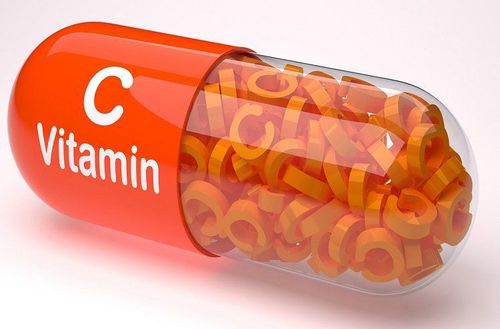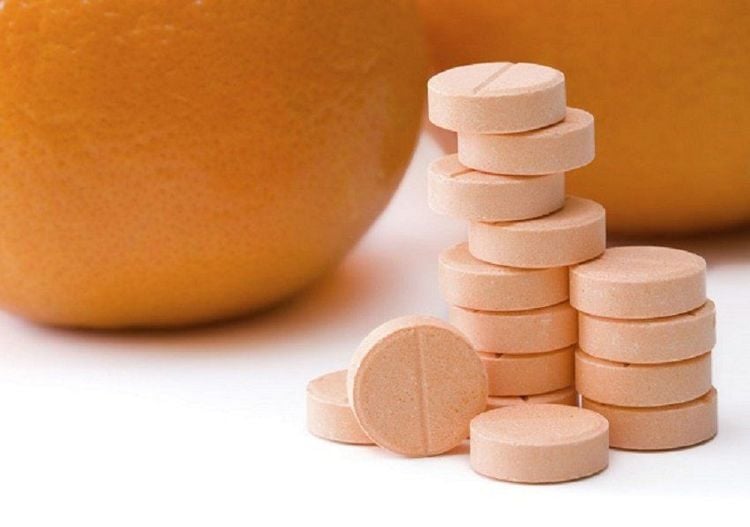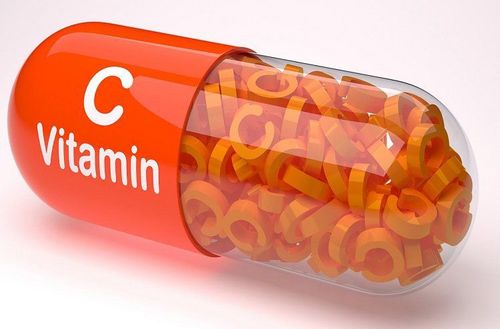This is an automatically translated article.
Vitamin C is quite safe when supplemented in food form. However, high doses of vitamin C supplements can have a risk of side effects, the most common of which are gastrointestinal symptoms and can have serious consequences such as iron deposition, kidney stones...
1. High-dose Vitamin C
Vitamin C is a very important nutrient found in many fruits and vegetables. Getting enough of this vitamin is especially important for maintaining a healthy immune system. Vitamin C also plays an important role in wound healing, keeping your bones strong, and boosting brain function. Some people claim that vitamin C supplements provide many benefits beyond those that can be obtained from vitamin C found in foods. One of the most common reasons people take vitamin C supplements is with the idea that they help prevent the common cold. However, many supplements contain extremely high amounts of the vitamin, which can cause unwanted side effects in some cases.
High-dose vitamin C solutions also known as cleansing agents contain ascorbate. Many people think that high levels of vitamin C (ascorbic acid) can help detoxify the body. However, it is advisable to include a large amount of vitamin C in your diet on a regular and reasonable basis.
2. The benefits of high dose vitamin C solution
Some people turn to vitamin C when they want a quick detox or for a quick recovery from an illness. The benefits of recommending taking vitamin C as a detox, affirming that vitamin C:
Helps increase the body's ability to store vitamin C To determine the amount of vitamin C the body needs each day Helps the body you can feel refreshed and energized Vitamin C is said to:
Has anti-aging properties Strengthens the immune system Helps the body absorb minerals Protects the body from chemical toxins Helps the body avoid free from infection

Vitamin C giúp cơ thể hấp thụ khoáng chất
3. Research on high doses of vitamin C
Although there are many anecdotal claims about the benefits of vitamin C, there isn't any scientific evidence supporting any of the above benefits. According to nutritionists, the only reason to take vitamin C supplements is to overcome vitamin C deficiency. Vitamin C deficiency mainly affects people living with low incomes.
Symptoms of vitamin C deficiency include:
Muscle pain or weakness Fatigue Fever Bruising Loss of appetite Bleeding or swollen gums Sores in your mouth Rash or formation of unexplained red spots If you suspect If you suspect that you have a substance deficiency, visit your doctor for timely diagnosis and treatment
4. How to use vitamin C
To use vitamin C safely and effectively, you should consult your doctor before deciding to use this compound.
Notes in the process of using vitamin C:
You can eat and drink normally during use. If you have a sensitive stomach, use buffered ascorbate powder that is bound to minerals like calcium and magnesium. Keep the amount of water you drink to replace the lost water. Liquid and watery stools.

Để sử dụng vitamin C một cách an toàn và hiệu quả, bạn nên được tư vấn bởi bác sĩ trước khi quyết định sử dụng
5. Side effects and potential risks
During the use of high doses of vitamin C, you may experience some symptoms: Bloating ; gas; Heartburn
Too much vitamin C can cause digestive symptoms
The most common side effect of too much vitamin C is indigestion. These side effects do not occur with the use of foods containing vitamin C, but rather from taking the vitamin in supplement form.
You are more likely to experience digestive-related symptoms if you consume more than 2,000 mg at a time. Therefore, a tolerable upper limit of vitamin C (TUL) of 2,000 mg per day has been established. The most common digestive-related symptoms of too much vitamin C are diarrhea and nausea.
Overeating has also been reported to lead to acid reflux, although this is not supported by evidence.
If you are experiencing digestive problems from taking too much vitamin C, simply cut back on your supplement dosage or avoid vitamin C supplements altogether.
Vitamin C can cause iron retention
Vitamin C is known enhances iron absorption. Vitamin C can bind to non-heme iron, found in plant foods. Non-heme iron is not absorbed by your body as efficiently as heme iron, which is commonly found in animal products.
Vitamin C binds to non-heme iron, making it easier for your body to absorb. This is an important function, especially for those who only consume iron from plant-based foods.
One study in adults showed a 67% increase in iron absorption when they supplemented with 100mg of vitamin C with a meal. However, people with conditions that increase the risk of iron accumulation in the body, such as hemoglobinopathy, should use vitamin C supplements with caution and should consult their doctor. Excessive vitamin C can lead to iron overload, and cause serious damage to the heart, liver, pancreas, thyroid and central nervous system of the body.
Taking vitamin supplements in high doses can lead to kidney stones
Excess vitamin C is excreted from the body as oxalates. Oxalate is normally eliminated from the body in the urine. However, in some cases, oxalates can bind with minerals and form crystals that persist in the body and lead to kidney stone formation. Too much vitamin C has the potential to increase urine oxalate levels, thereby increasing the risk of developing kidney stones.
In a study taking a 1,000 mg vitamin C supplement in adults twice daily for 6 days, excretion of oxalate in these subjects increased by 20%. Taking more vitamin C is not only associated with higher levels of urinary oxalate, but also with the development of kidney stones, especially if you take a vitamin C supplement greater than 2,000 mg.
6. Vitamin C Supplement Dosage
Since vitamin C is water soluble and your body excretes excess amounts of this vitamin within a few hours of taking it, excess intake is limited. In fact, it's almost impossible to get too much vitamin C from your daily diet. In healthy individuals, when the amount of vitamin C added exceeds the recommended daily amount, it is eliminated from the body.
However, the risk of vitamin C overdose is higher when people take supplements that contain vitamin C. The side effects of vitamin C when taken in excess can be greater than 2000mg, including digestive disorders and kidney stones.
If you choose to take a vitamin C supplement, you should choose one that contains no more than 100% of your daily needs. Vitamin C products should include 90 mg per day for men and 75 mg per day for women.
You should never take vitamin C supplements without your doctor's supervision. Consuming large doses of vitamin C and stopping suddenly can cause serious complications.
You should also avoid high doses of vitamin C if you have:
Hemoglobin disease Gilbert's disease Irritable bowel syndrome (IBS) Inflammatory bowel disease (IBD) Hepatitis Kidney problems
Please dial HOTLINE for more information or register for an appointment HERE. Download MyVinmec app to make appointments faster and to manage your bookings easily.
Reference source: healthline.com













